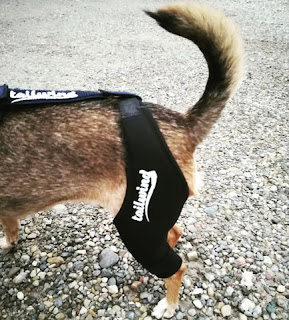As
our furry companions age, they often face health issues similar to those in
humans, such as arthritis and other joint problems. One particularly common
ailment in senior dogs is arthritis, which can significantly impair their
mobility and overall quality of life. Fortunately, dog knee braces have emerged as a valuable tool in managing these
conditions, providing benefits not only for the pet but also for their owners.
Understanding
the Need for Dog Knee Braces
Dog braces are designed to offer support and stability to a
dog's knee joint, particularly the stifle joint, which is equivalent to the
human knee. This support is crucial for dogs suffering from arthritis, ligament
injuries, or post-surgical recovery. Arthritis, a degenerative joint disease,
causes pain, swelling, and decreased mobility, making it difficult for dogs to
engage in their daily activities. Knee braces for dogs help alleviate these symptoms by stabilizing the joint,
reducing pain, and allowing for more comfortable movement.
Benefits for
the Pet
The
primary beneficiary of a knee brace is, of course, the dog. Knee braces
can significantly improve a dog's quality of life by reducing pain and
enhancing mobility. By providing stability to the affected joint, a dog knee brace
helps to prevent excessive movements that could exacerbate the condition. This
stability not only alleviates pain but also reduces the risk of further injury.
For dogs recovering from surgery, knee braces can aid in the healing process by
supporting the joint and allowing for controlled movement. Furthermore, the
increased mobility enabled by knee braces helps maintain muscle tone and
overall physical health, which are crucial for a dog’s long-term well-being.
Psychological
Benefits for the Dog
In
addition to the physical benefits, knee braces
can have a positive impact on a dog's mental health. Dogs thrive on activity
and interaction with their environment. When arthritis or joint pain limits
their mobility, it can lead to frustration, depression, and a decrease in their
overall happiness. By improving mobility, knee braces enable dogs to engage
more with their surroundings, play, and interact with their owners and other
pets. This increased activity can significantly boost their mood and overall
quality of life.
Benefits for
the Owner
While
the primary focus of using a knee brace
is to help the dog, there are substantial benefits for the owner as well.
Seeing a beloved pet in pain and struggling to move is distressing for any pet
owner. Knee braces can alleviate
this stress by improving the dog’s condition and quality of life. Owners can
feel more confident that they are providing the best possible care for their
pet, which can enhance their own peace of mind.
Enhanced
Bond Between Pet and Owner
A
dog’s limited mobility can strain the relationship between pet and owner.
Owners may need to carry their dogs, limit their activities, or watch them
struggle with basic movements. By using a dog knee brace,
dogs regain a level of independence, which can reduce the burden on the owner.
This renewed independence allows for more enjoyable interactions, such as going
for walks or playing together, thereby strengthening the bond between pet and
owner.
Practical
Considerations and Ease of Use
Modern
knee braces for dogs are designed with both the pet and the owner in mind. They are
typically easy to put on and adjust, ensuring a secure and comfortable fit for
the dog. Many dog braces are made from
lightweight, breathable materials that provide support without causing
discomfort. This ease of use means that owners can quickly and efficiently fit
the brace onto their dog, making it a practical solution for everyday use.
Conclusion
A dog knee brace is an essential tool for managing arthritis and other joint issues in dogs. They provide significant physical and psychological benefits for the dog, enhancing mobility, reducing pain, and improving overall quality of life. For owners, knee braces offer peace of mind and strengthen the bond with their pets by enabling more active and enjoyable interactions. As a practical and effective solution, dog knee braces are invaluable for both the pet and the owner, ensuring that senior dogs can continue to live active, happy lives.










